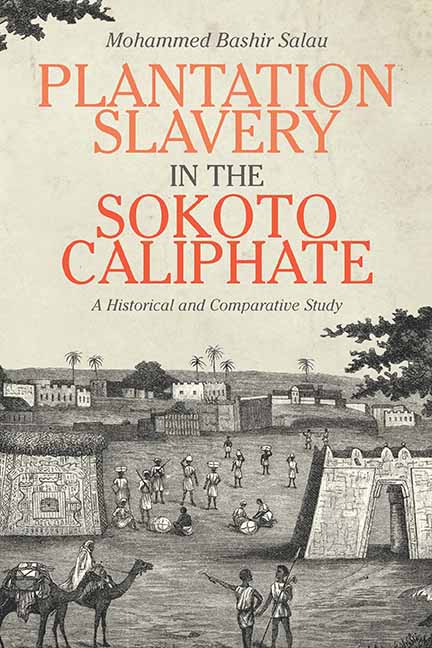Book contents
- Frontmatter
- Contents
- List of Illustrations
- Acknowledgments
- Introduction
- 1 Race and Slavery in the Sokoto Caliphate
- 2 The Roots of Sokoto Caliphate Plantations
- 3 The Course of Plantation Development
- 4 The Types, Structures, and Characteristics of Plantations
- 5 Observations on Slave Origins, Slave Resistance, and Labor Control
- 6 The Significance of Plantations
- 7 Plantations in the New World and in Coastal East Africa Compared
- Conclusion
- Notes
- Bibliography
- Index
- Frontmatter
- Contents
- List of Illustrations
- Acknowledgments
- Introduction
- 1 Race and Slavery in the Sokoto Caliphate
- 2 The Roots of Sokoto Caliphate Plantations
- 3 The Course of Plantation Development
- 4 The Types, Structures, and Characteristics of Plantations
- 5 Observations on Slave Origins, Slave Resistance, and Labor Control
- 6 The Significance of Plantations
- 7 Plantations in the New World and in Coastal East Africa Compared
- Conclusion
- Notes
- Bibliography
- Index
Summary
Genuine “slave economies”—in which slave labour permeated all sectors of the economy and played a central role in economic output outside the sphere of family labour—were rare in history.’ Classical Greece and the Italian heartland of the Roman empire are among the most notable cases. This raises important questions: how did the Greeks and Romans come to join this exclusive club, and how did the circumstances that determined the development and structure of their regimes of slave labour compare to those that shaped other slave-rich systems?
With these words, Walter Scheidel began his interesting recent article on the expansion and nature of slavery in Classical Greece and Republican Rome. Read at its broadest, though dealing with very similar issues largely related to the development and nature of slavery in highdensity slave systems, as well as with the theme of comparative slavery, the present work, rather than focusing primarily on slavery in Classical Greece and Republican Rome, primarily focuses on plantation slavery in the largest Islamic state of nineteenth-century West Africa: the Sokoto caliphate.
The Sokoto caliphate (1804–1903) was situated in the central Sudan region of West Africa. It comprised two ecological zones: the Sudan savanna and the Guinea savanna. The former covered the northern parts of the caliphate, while the latter prevailed in the southern parts of the state. The soil types in the Guinea savanna support the production of diverse crops such as yam, cassava, guinea corn, cotton, tobacco, soy beans, cowpeas, and rice, while those in the Sudan savanna are more favorable for the production of cereals (millet, sorghum, maize, and rice), cotton, groundnuts, and legumes, as well as for livestock rearing.
The caliphate was established through a jihad led by a Fulani cleric known as Usman dan Fodio at the beginning of the nineteenth century. Hausaland was the principal theater of the jihad. Before the jihad, Hausaland consisted of several centralized Hausa governments or city states that were organized around markets, palaces, towns, and “closely settled zones.” These Hausa states had a long history of involvement in international trade, and by 1500 most of their rulers had embraced Islam. On the eve of the jihad, the Hausa states were ruled by nominal Muslims, and they were at war with each other.
- Type
- Chapter
- Information
- Plantation Slavery in the Sokoto CaliphateA Historical and Comparative Study, pp. 1 - 30Publisher: Boydell & BrewerPrint publication year: 2018



